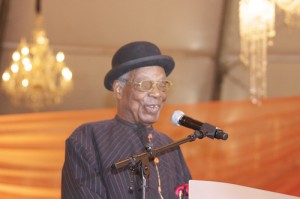
He died on Sunday afternoon at the National Hospital in Abuja at the age of 96.
His son, a legal practitioner, Geoffrey Oputa, confirmed his death in a telephone interview with Channels Television’s judiciary correspondent, Shola Soyele.
Mr Oputa says the late Justice Oputa suffered a stroke on the February 14. He said that a plan to fly him abroad for treatment was shelved when he gradually recovered and was at home until Sunday morning when his health worsened.
“He was taken to the National Hospital this morning and eventually died this afternoon,” he said.
He is survived by a wife and three children among whom is a popular musician, Charly Boy and legal practitioner, Geoffrey Oputa.
The family said that they would issue a public release on Monday.
Justice Oputa is still widely revered for his role in handling the affairs of the famous Oputa panel.
In reaction, a former first Vice President of the Nigerian Bar Association, Funke Adekoya, said: “The bar has lost another of its icons, our own Lord Denning. He was one of the greatest philosopher judges, Nigeria has produced and his judgment always displayed an interplay between law and morality”.
Mr Femi Falana, a lawyer, says “the greatest tribute that can be paid to Justice Oputa is for the Federal Government to release the Report of the Oputa Panel and proceed to implement the recommendations of the Panel. For the legal profession Justice Oputa should be celebrated for his incorruptibility and consistent defence of humsn rights, rule of law and democracy”.
Another lawyer, Festus Keyamo says, “Justice Oputa, The Lord Denning of our time, gave all his life and energy for the development of the law, the maintenance of the etiquette of the legal profession and the sanctity of the Bench. Both as a Judge of the High Court and as a Justice of other superior courts, his incisive judgments, robust and notable pronouncements and quintessential erudition in all his decisions on the Bench, have left an indelible mark in the legal profession. His calmness and remarkable wit on the Bench has since laid down a mark for other judicial officers to follow”.
Profile
He was born in Oguta in Imo State, to the family of Chief Oputa Izukwu and Madam Nwanetu Oputa. He had his early education in Sacred Heart School, Oguta and Christ the king College, Onitsha in Anambra State.
The young Oputa then went on to Yaba Higher College, but due to the exigencies of the Second World War, was sent along with others to the famous Achimota College, Ghana, then Gold Coast. There he graduated with a B.Sc (Hon) Economics in 1945. After this he came back to Nigeria and took up a teaching appointment with Calabari National College. He later came to Lagos where he worked as an Assistant District Officer. It was here that Justice Oputa achieved a remarkable feat; he studied at home and obtained his BA (Hon) history at home.
Justice Oputa then proceeded to London where he got his LLB (HON) and was called to Bar in Gray’s Inn, London.
After his return to Nigeria as a lawyer, Oputa went into private practice, handling such celebrated cases and special inquires as the Oguta Chieftaincy dispute 1958/59, the Amanyanabo Dispute 1956/ 60 and many more.
In 1966, Justice Oputa was appointed Judge of the High Court of the then Eastern Nigeria and moved on to become the first Chief Judge of Imo State ten years later.
In 1984, he was elevated to the Supreme Court of Nigeria from where he retired in 1989.
There, Justice Oputa put his stamp on the Supreme Court as a man profoundly moved by classical literature, history, divinity and philosophy and whose judgments possessed the temerity that is in the preserve of genius.
The late Justice Oputa would best be remembered for chairing former President Olusegun Obasanjo’s Human Rights Investigation Panel after Nigeria’s return to democratic rule at the turn of the millennium.
